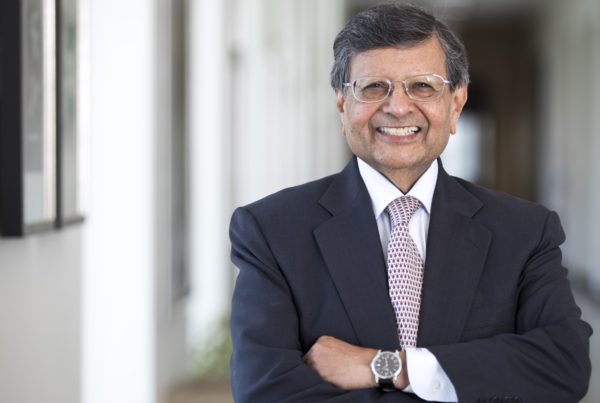Published: Jun 12, 2008 in Knowledge@Emory
Azim Premji inherited his father’s $2 million hydrogenated cooking fat company in 1966, repositioned it and created Wipro Ltd., a Bangalore, India-based IT services organization with 2007 revenues of $3.4 billion. As holder of more than 80% of the company’s stock, Wipro’s Chairman and CEO has become one of the world’s wealthiest men with an estimated net worth of just under $13 billion—a total that slots him at number 60 on Forbes magazine’s 2008 list of the World’s Billionaires.
Those who know Premji say he is low-key and it’s his ability to relate to anyone –from prime minister to gardener—that has contributed to his success. During a recent visit to Emory University’s Goizueta Business School as part of the 2008 Leadership Speaker Series, Premji—named one of the “Greatest Entrepreneurs of All Time” by BusinessWeek—shared his ideas on leadership with students and several Atlanta-area business leaders, including Turner Broadcasting System, Inc. (TBS) Chairman and CEO Philip Kent, TBS CTO Scott Teissler, and TBS Senior Vice President, Strategic Planning, Kevin Cohen. In his presentation, Premji chronicled what he calls his “simple lessons” of leadership. The most important one of all? To dream big.
After the death of his father in 1966, Premji, then 21 years old, dropped out of Stanford, returned to India and took over his father’s company. He admits he was completely unprepared for the experience. But when Premji walked through the doors of the company, he did so with the belief he could build a great organization. “If you dream big, you can achieve more in life,” he explains, adding that the dreams needn’t be realistic because the purpose of dreams is to “turbo-charge you.”
Setting the standard for an organization is a necessary aspect of good leadership as well, and Premji doesn’t believe this is possible if the leader doesn’t do so with honesty and integrity. He advised the audience never to sacrifice integrity for short-term results. “What you do today—can you afford to see it in the newspaper tomorrow? Can you look in the mirror and talk to your wife about it? Talk to your parents about it?” he asks.
Jagdish Sheth, a chaired professor of marketing at Goizueta and author of “The Self-Destructive Habits of Good Companies… And How to Break Them” [Pearson Education, Inc. 2007], has observed Premji’s leadership style for years. Sheth, also a Wipro board member, explains that Premji takes a long-term view in terms of Wipro, not a view that’s driven quarter by quarter. “He does what he thinks is right and is willing to take the consequences from Wall Street,” notes Sheth.
Wipro’s stock trades on the NYSE, and in the last year, the stock dropped from hovering in the neighborhood of $16 per share to trading closer to $13 per share. The drop in share price caused a sizeable decrease in Premji’s personal wealth—about four billion dollars. But that’s not what motivates him, says Sheth, who compares Premji to Warren Buffet, founder of conglomerate Berkshire Hathaway, noted philanthropist, and, as of early 2008, the world’s richest man. Known for being unpretentious, Buffet lives in Omaha, Nebraska in a house he bought in 1958.
“Leadership is about shaping expectations of all the stakeholders—customers, employees, investors, suppliers, the community,” adds Sheth. “Management is about delivery and executing those expectations. They are different skill sets.” Great leaders like Premji, says Sheth, do both well.
Striving for excellence is also a Premji standard, and he realizes that he, and leaders like him, set the tone for their organizations. During his lecture at Goizueta, he touched on several things he believes Wipro can improve upon and talked about the steps being taken to make such improvements. “Excellence is not an act, it’s a habit,” he states. In a global economy, Wipro not only competes with similar companies in India, but across the globe. Premji’s goal is for Wipro to be the best at what it does—period.
To aid in this accomplishment, Wipro leadership must be “globalized.” “This requires a huge adjustment,” notes Premji. With 80,000 employees—15,000 of them located outside of India—leadership needs to be culturally sensitive. Working in teams is also an integral part of how Wipro does business, and an employee’s ability to be a contributing member of a cross-cultural team has become increasingly important to the company’s success.
Premji is a champion of education, and he sees the shortage of science and technology talent in the U.S. as a huge problem. “Western education is not doing enough [to get students] into science and engineering,” he says. This year, India, with a population of 1.13 billion people, will graduate approximately 500,000 engineers—or one engineer for every 2600 citizens of India. With a population of 303 million, the U.S. will turn out 75,000 engineers—one for every 4040 of its citizens.
The company employs approximately 8000 people in the U.S. and recently opened its first American software development center in Atlanta, GA. Within the next year, Wipro plans to hire 200 employees for its Atlanta office. That number is estimated to jump to 500 in the next three years as Wipro recruits IT graduates from local schools, trains them, and puts them to work. “Your business will have a base wherever it can find the best value of talent and cost,” explains Premji, who is also building capacity in China and the Philippines. “Our biggest challenge is scaling and maintaining uniformity of culture. The uniformity of customer experience has to be the same. It has to be consistent.”
One of Premji’s greatest talents, observes Sheth, is his ability to recognize talent. “He’s just like a good coach. Good coaches can get more potential out of an athlete than the athlete realizes,” Sheth says. “The coaching model of leadership is important. It’s essentially a ‘tough love’ message. You invest in talent to get more out of someone.” This has proven true of Premji. According to Sheth, more than six-dozen former Wipro employees have launched successful businesses around the world.
Not surprisingly, Premji believes self-confidence is a necessary part of good leadership. That confidence allows leaders to take risks and learn from them, including lessons gleaned from the occasional failure that accompanies risk taking. Premji recently told a group of graduates in Chennai India, “Self-confident people assume responsibility for their mistakes and share credit with their team members…. Remember, no one can make you feel inferior without your consent.”
A lean 62-year-old, Premji is big on regular exercise. “You need tenacity and energy to be in a leadership position,” he says.
One of India’s leading providers of system integration and outsourcing services, Wipro also manufactures a variety of consumer products, including hand soap. Operating in nearly three-dozen countries, the company’s Wipro Technologies division offers software development and business process outsourcing (BPO) services, management consulting and product engineering.





